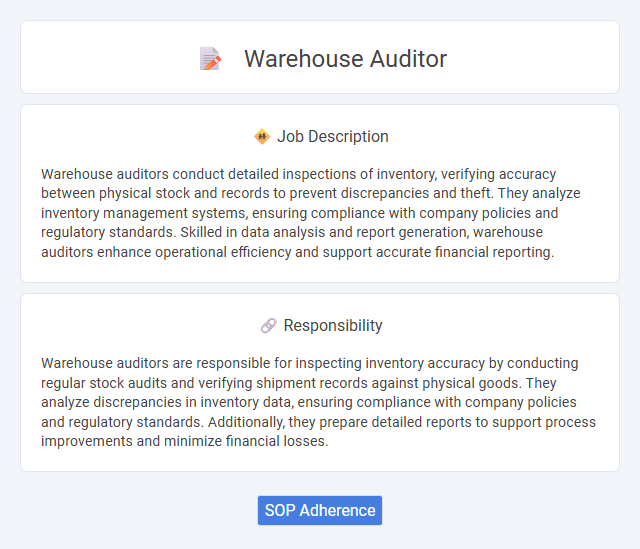
Warehouse auditors conduct detailed inspections of inventory, verifying accuracy between physical stock and records to prevent discrepancies and theft. They analyze inventory management systems, ensuring compliance with company policies and regulatory standards. Skilled in data analysis and report generation, warehouse auditors enhance operational efficiency and support accurate financial reporting.
Candidates with strong attention to detail and the ability to work independently are likely suitable for a warehouse auditor role. Those comfortable with repetitive tasks and maintaining accuracy under pressure may find this job aligns well with their skills. Individuals who struggle with focus or prefer dynamic, fast-paced roles might face challenges adapting to the structured environment of warehouse auditing.
Qualification
Warehouse auditor candidates must have a strong background in inventory management, logistics, and supply chain processes, typically supported by a bachelor's degree in business administration, logistics, or a related field. Proficiency in auditing software, data analysis tools, and knowledge of regulatory compliance standards such as OSHA and ISO is essential. Strong analytical skills, attention to detail, and experience in conducting physical inventory audits are critical qualifications for ensuring accurate stock management and operational efficiency.
Responsibility
Warehouse auditors are responsible for inspecting inventory accuracy by conducting regular stock audits and verifying shipment records against physical goods. They analyze discrepancies in inventory data, ensuring compliance with company policies and regulatory standards. Additionally, they prepare detailed reports to support process improvements and minimize financial losses.
Benefit
Warehouse auditor roles likely offer substantial benefits such as enhanced organizational skills and in-depth knowledge of inventory management systems. Employees in this position may gain opportunities for career advancement within logistics and supply chain sectors. Competitive salaries and potential for bonuses related to audit accuracy could be expected as part of the compensation package.
Challenge
Warehouse auditor roles likely present challenges in maintaining accuracy amid high volumes of inventory data. Ensuring compliance with regulatory standards and company policies may require meticulous attention to detail and thorough documentation. The probability of encountering discrepancies or operational inefficiencies could necessitate critical thinking and problem-solving skills to optimize warehouse processes.
Career Advancement
Warehouse auditors play a critical role in ensuring inventory accuracy, compliance, and operational efficiency within supply chain management. Mastery of auditing tools and data analysis techniques creates pathways for advancement into senior audit roles, compliance management, or supply chain analytics. Professionals who consistently deliver precise audit reports and recommend process improvements often transition into leadership positions such as warehouse operations manager or quality control supervisor.
Key Terms
SOP Adherence
Warehouse auditors play a crucial role in ensuring strict adherence to Standard Operating Procedures (SOPs) within inventory management and logistics operations. They systematically review and verify compliance with established protocols to maintain accuracy, safety, and efficiency in warehouse processes. Regular audits help identify procedural discrepancies, reduce operational risks, and support continuous improvement initiatives.
 kuljobs.com
kuljobs.com